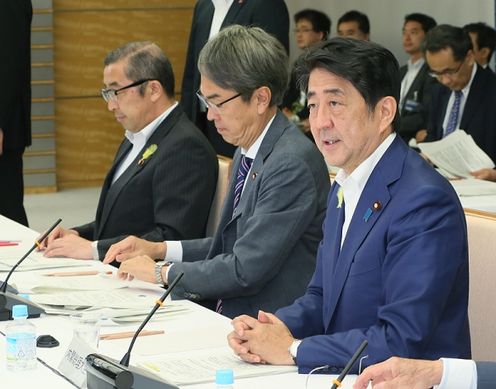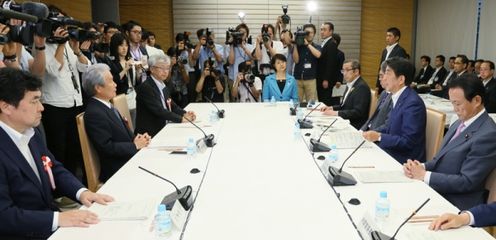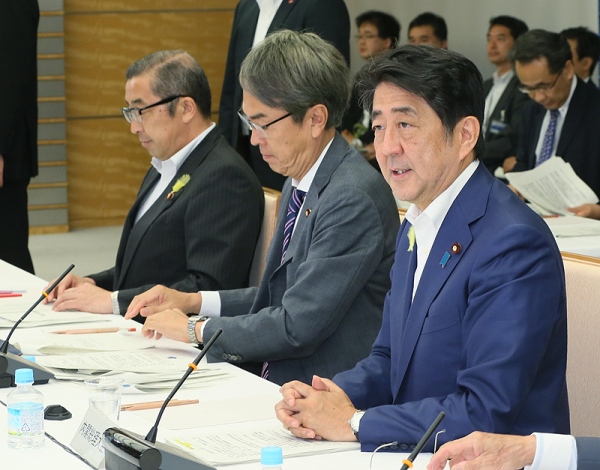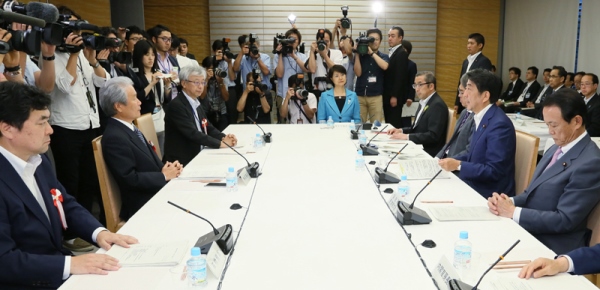Home > News > The Prime Minister in Action > July 2016 > Meeting of the Council on Economic and Fiscal Policy
The Prime Minister in Action
Meeting of the Council on Economic and Fiscal Policy
July 13, 2016

Photograph of the Prime Minister making a statement (1)

Photograph of the Prime Minister making a statement (1)

Photograph of the Prime Minister making a statement (2)
[Provisional Translation]
Prime Minister Shinzo Abe held the 12th meeting in 2016 of the Council on Economic and Fiscal Policy at the Prime Minister's Office.
At the meeting, there was a discussion on the minimum wage; future economic and fiscal management, and measures of the Council on Economic and Fiscal Policy; and the overall approach to the budget for the coming fiscal year.
Based on the discussion, the Prime Minister said,
“Today we first held a discussion on the minimum wage. This fiscal year marks the first year of our aiming for the national weighted average to reach 1,000 yen, while simultaneously considering the growth rate of the nominal GDP.
In regard to this fiscal year, I would like to request the Minister of Health, Labour and Welfare, and the Minister of Economy, Trade and Industry to exert their full efforts towards achieving a 3% increase. In particular, I would like them to ensure that there is no impact on support for SMEs and small businesses.
We received submissions from private-sector members on future economic and fiscal management, and issues of the Council on Economic and Fiscal Policy, as well as on the overall approach to the budget for the coming fiscal year.
In regard to economic policies, I think the keyword is investment for the future.
As priority matters, first is the acceleration of a society in which all citizens are dynamically engaged, which is now entering the stage of realization.
The second priority matter is creating infrastructure suited to the 21st century. We will implement infrastructure towards stimulating tourism and promoting exports of agricultural products, and establishing the Superconducting Maglev (SCMAGLEV) Chuo Shinkansen ahead of schedule.
Third is providing funding support for SMEs and small businesses in response to risks such as instability resulting from the UK exit from the EU.
And fourth is implementing reconstructioncovery from the Kumamoto earthquakes and the strengthening of disaster prevention measures.
We will carry out comprehensive and bold economic measures with the goals of implementing structural reforms, starting with workstyle reforms, and investment for the future, like two wheels on the same axle, to propel these measures.
We must act so that measures toward the realization of a society in which all citizens are dynamically engaged can be thoroughly and steadily implemented, including through the utilization of the fruits of Abenomics, combining the supplementary budget for economic measures to be compiled in the future and the budget for FY 2017.
At the same time, while reviewing the effects of the postponement of the increase in the consumption tax, we will steadily advance expenditure reform toward the goal of achieving fiscal soundness by FY2020.
I would like you to compile the overall approach to next year’s budget while taking into consideration these points.”


